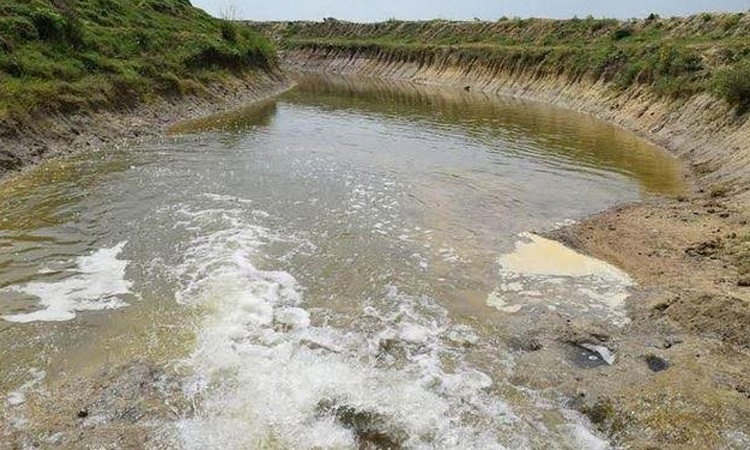News Flash

By Md Aynal Haque
RAJSHAHI, Sept 7, 2025 (BSS)- Experts unequivocally called for protecting existing rivers and canals as a crucial means of ensuring year-round irrigation water coupled with reducing the gradually increasing pressure on groundwater resources.
Simultaneously, implementing strategies for artificial groundwater recharge and managed aquifer recharge can help to replenish and maintain the declining groundwater levels.
Talking to BSS, Prof Mijanur Rahman of the Department of Geography and Environmental Sciences at Rajshahi University (RU) said this is the right time for encouraging farmers to cultivate less water-intensive indigenous crops like wheat, maize, lentils, sesame, and chickpea instead of water-heavy Boro paddy.
He observed that the drought caused by climate change has been posing a serious threat to agriculture and sustainable water management in Barind.
Adverse impact of climate change has also been affecting the living and livelihood conditions of the marginalized populations in the region badly.
In its 18th executive committee meeting on August 25last, National Water Resource Council has declared 215 Unions under Rajshahi, Chapainawabganj and Naogaon Districts as the highest water crisis area and 1,503 villages as the extreme water crisis.
Promote efficient irrigation techniques and the adoption of conjunctive water use, which combines surface water and groundwater for better water management.
Introduce crops that require minimal irrigation, such as sugarcane, which needs only a few irrigations throughout the year and has shown promise in the region.
Prof Rahman said the "double lifting" initiative involves bringing water from the Padma River over long distances and pumping it to higher elevations to serve the Barind Tract, providing a crucial alternative to groundwater.
Extend knowledge and devices for rainwater harvesting to communities to enable them to collect and store rainwater for various uses, mitigating the water crisis.
Create awareness programs to educate communities on water conservation methods and the importance of protecting water resources.
Develop agro-ecological plans that focus on drought-resistant crops and sustainable water management practices to address the unique challenges of the Barind region.
Prof Chowdhury Sarwar Jahan of the Department of Geology and Mining at RU noted that the Barind region is among the worst-hit by droughts, with the number of consecutive dry days and temperature steadily increasing over the past 30 years.
Drought episodes have become more erratic due to climate change-a trend likely to worsen in the coming decades.
Prof Chowdhury said droughts create severe challenges for vulnerable communities.
During dry spells, most natural surface water sources evaporate, leaving no water for drinking, sanitation, or agriculture.
Overall, the human cost includes higher disease incidence-especially among children-malnutrition from crop failure, increased poverty and stunted development.
The Barind's average annual rainfall of 1,400 mm is far below the national average of 2,300 mm. Rainwater does not easily seep into aquifers due to clay soils with low porosity, leading to high evaporation.
Moreover, there are no large or deep surface water sources-like lakes or rivers-so groundwater recharge is very slow.
During droughts, people traditionally use hand-pumped tube wells, which draw from shallow aquifers dependent on seasonal rainfall. However, under current drought regimes, these aquifers dry up, rendering tube wells ineffective.
Prof Sarwar Chowdhury, however, said implementation and promotion of climate-resilient agriculture planning, planned water resource management, crop diversification and compost, bio-fertilizer and bio-pesticides can be the crucial means of mitigating the drought situation.
Besides, utmost importance should be given to transforming the existing irrigation system in the Barind area into a surface water-based system instead of the groundwater ones to mitigate the existing water-stressed condition. Promotion of less-water consuming crops can also be the best way in this regard.
Promoting integrated water resource management has become an urgent need to meet the gradually increasing demand for water in the region, particularly the drought-prone Barind tract.
Quoting his research findings Prof Niamul Bari of the Department of Civil Engineering at Rajshahi University of Engineering and Technology said the rate of aquifer depletion is "critical" in most areas of high barind lands due to various natural and manmade reasons.
He said the groundwater levels in some areas of Godagari and Tanore upazilas in Rajshahi are decreasing every year, which indicates that the aquifers are under pressure.
The groundwater level at Kolma, Mundumala, Deopara and Kakonhat areas in the two upazilas has reached near the aquifer, which is alarming.
Prof Bari identically mentioned the absence of an aquifer at even 445 metres below the surface. Groundwater depletion is affecting the region's ecology. "Other than the surface water, there's no other choice left in Barind," he added.
So, there is an urgent need for a complete water management system in the water-stressed Barind region and an increase in the use of surface water to reduce pressure on groundwater.
As a whole, he opined that sustainable water resource management in the region requires a holistic approach, focusing on efficient water supply, demand management and the conservation of surface and groundwater resources, while also considering the ecological, social, and economic needs of the region.
Besides, a geospatial approach for developing an integrated water resource management plan in Rajshahi needs to be adopted.